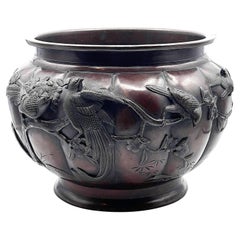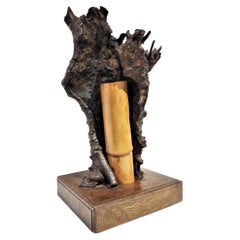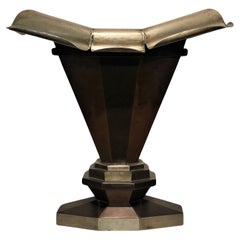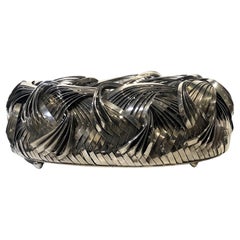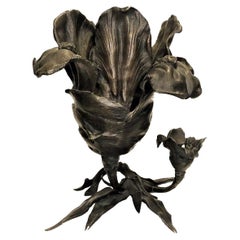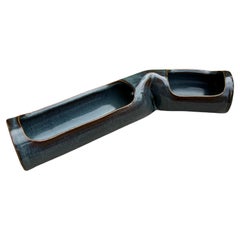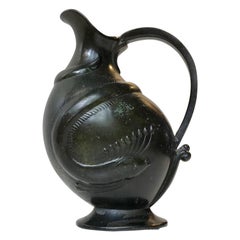Ashville Fine Arts Planters, Cachepots and Jardinières
to
5
2
3
2
1
1
1
1
2
1
4
2
1
1
5
3
3
3
1
1
Height
to
Width
to
5
5
5
Japanese Edo Period Bronze Jardinière w/ Birds & Cherry Blossom Tree, 19th C.
Located in New York, NY
#350
Japanese Edo Period Bronze Jardinière w/ Birds & Cherry Blossom Tree, 19th C.
DIMENSIONS:
Height: 9 inches
Diameter: 12 inches
DETAILS
Edo Period (1603-1868) Meiji Period (...
Category
Antique Mid-19th Century Japanese Japonisme Planters, Cachepots and Jard...
Materials
Bronze
Atique Japanese Rootwood & Bamboo Ikebana Vase, XIX Century
Located in New York, NY
Atique
Rootwood & Bamboo
Ikebana Vase
Japan, XIX Century
DIMENSIONS
Height: 19.25vinches
Width: 10.13 inches
Depth: 9.5 inches
ABOUT
This absolutely unique ikebana vase consists of...
Category
Antique Late 19th Century Japanese Japonisme Planters, Cachepots and Jar...
Materials
Bamboo, Wood
American Art Deco Anodized & Painted Metal Planter, ca. 1920s
Located in New York, NY
American Art Deco
Planter with Geometrical Design
Anodized & Painted Metal
ca. 1920s
DIMENSIONS
Height: 13.5 inches
Width: 14.5 inches
Depth: 8.25 inches
Category
Vintage 1920s American Art Deco Planters, Cachepots and Jardinières
Materials
Metal
Japanese Art Deco Ikebana Chromed Metal Basket, ca. 1930s
Located in New York, NY
Art Deco
Ikebana Basket
Chromed Metal
Japan, ca. 1930s
ABOUT
Ikebana is the Japanese art of of beautifully arranging cut stems, leaves, and flowers in vases and other containers t...
Category
Vintage 1930s Japanese Art Deco Planters, Cachepots and Jardinières
Materials
Metal
French Art Nouveau Patinated Bronze Sculptural Iris Vase, ca. 1900
Located in New York, NY
ABOUT IRIS
The iris is a special and mysterious flower. Not only because of its striking appearance, but also from an artistic and historical point of view. It is also like a work of art, as though created by Mother Nature. The unique leaves of this plant not only create wonderful shadow casts, but also look as if they were painted by hand. It's no wonder that iris acts as the muse for countless artists, and can be seen in many famous works of art.
The iris was first spotted in the time of Pharaoh Thutmose, in 1504 BC. He had the iris inscribed into the wall reliefs of a temple as a sign of his power, as well as decorating his sceptre with motifs of the flower. Since then, the iris has been a symbol of victory in Egypt. But the symbolism of the iris goes further than that. In Japan, the flower represents courage and is the symbol of the boys' festival. In Islamic cultures, the iris is a symbol of prosperity. In Europe, the flower was a popular weapon symbol in the Middle Ages and stood for chivalry. And in Christianity, the iris was seen as a symbol of the trinity because of its three-part flowers. With more than 300 varieties, the iris is now the most popular flower among growers and gardeners following the rose.
Countless artists use the iris in their works and the flower is present in all eras. You can see the flower on furniture, vases, jewelry, fabrics, sculptures, coats of arms and much more. Did you know that the iris is also called the sword lily? It's not a coincidence that it used to symbolize physical and emotional pain and suffering caused by a weapon. We also see the flower in religious art, where it's often associated with Mary and Jesus. The iris is also associated with the Greek goddess Iris, where the flower symbolizes reconciliation and divine messages. This is also reflected in many paintings.
Finally, the iris is also visible in Dutch and Flemish still-life paintings. This can be in a religious form, incorporated into an object or as a decorative flower.
In the Art Nouveau art movement, the iris (along with other plants, such as the birch) was often used as an expression of feminine beauty. With its almost otherworldly appearance, the iris is perfectly suited to the Art Nouveau aesthetic and is featured in many well-known works of art. The poet of that era, Hermann Hesse...
Category
Antique Early 1900s French Art Nouveau Planters, Cachepots and Jardinières
Materials
Bronze
Related Items
Modernist Japanese Ikebana Vase, Japan, 20th Century
By Toyo
Located in San Juan Capistrano, CA
Modernist Japanese Ikebana Vase, Japan, 20th Century.
Category
20th Century Japanese Mid-Century Modern Vases
Materials
Ceramic
1920s Art Deco Jug in Disko Metal by Krone Copenhagen
Located in Esbjerg, DK
A very early Art Deco styled jug made in Denmark during the 1920s. Japanese or Chinese inspired decor. It is made from Disko Metal an alloy made mainly from pewter with applied verdi...
Category
Vintage 1920s Danish Art Deco Vases
Materials
Metal
Émile Gallé Miniature Cameo Vase, Art Nouveau, Ca 1900
By Émile Gallé
Located in Delft, NL
Émile Gallé miniature Cameo vase, Art Nouveau, ca 1900
Émile Gallé (Nancy, 1846 –1904) was a French glassmaker and furniture designer
Émile Gallé 7...
Category
Early 20th Century French Art Nouveau Vases
Materials
Glass
Early Art Deco Vase by Just Andersen, 1920s, Denmark
By Just Andersen
Located in Værløse, DK
Early Vase designed by Just Andersen in the 1920s. A fine piece for the exquisite home.
* A fan-shaped metal vase with vertical lines and lugs
* Designer: Just Andersen
* Model: D20...
Category
Vintage 1920s Danish Art Deco Vases
Materials
Metal
Art Deco Hand Painted Earthenware Vase with Worms, 1920s
Located in Esbjerg, DK
Unusual and organically shaped pottery vase decorated with worms or eels. Designed and manufactured by Knabstrup in Denmark during the 1920s. Measurements: H: 15 cm, D: 12 cm at the ...
Category
Vintage 1920s Danish Art Deco Vases
Materials
Earthenware
Art Deco Pair of Planters France, circa 1920s
Located in Isle Sur La Sorgue, Vaucluse
Very pretty pair of rotund Art Deco planters made out of cast iron (or possible cast aluminium but fairly heavy). Nice washed-out light grey patina.
Category
Early 20th Century French Art Deco Planters and Jardinieres
Materials
Iron
5 George Sakier Art Deco Vases, 1930s
By George Sakier
Located in Westport, CT
Set of 5 George Sakier glass vases, 1930s Fostoria Glass co, hard to find tall vases in very good condition. Large vases are 12.75 x 5” and smaller ones a...
Category
Early 20th Century American Art Deco Glass
Materials
Blown Glass, Reeded Glass
Mid-Century Modernist Ikebana Vase, Japan 1950s
Located in San Diego, CA
Modernist Ikebana vase with a vessel structure and textured surface. Unknown signature in bottom. Japan, 1950s.
Mid-Century, Hollywood Regency, Art Deco, Eclectic, Coastal, Modern,...
Category
Vintage 1950s Japanese Mid-Century Modern Vases
Materials
Clay
Émile Gallé small Cameo vase, Art Nouveau, ca 1900
By Émile Gallé
Located in Delft, NL
Émile Gallé small Cameo vase, Art Nouveau, ca 1900
Émile Gallé (Nancy, 1846 –1904) was a French glassmaker and furniture designer
Émile Gallé 20 cm hig...
Category
Early 20th Century French Art Nouveau Vases
Materials
Glass
Toyo Japanese Ikebana Vase, 1960s
By Toyo
Located in San Juan Capistrano, CA
This Japanese ikebana vase was made in the 1960s. It has a textured exterior with a glaze applied with a large brush and a highly contrasting glossy chocolate interior glaze. The foo...
Category
Vintage 1960s Japanese Mid-Century Modern Vases
Materials
Ceramic
Large 19th Century Japanese Meiji Period Bronze Vase
Located in Brighton, Sussex
A large fine quality late 19th century (Meiji period 1868-1912) Japanese bronze vase. Having wonderful raised jeweled decoration depicting a merchant showing his wares. Measures: 58 ...
Category
Antique Late 19th Century Japanese Vases
Materials
Bronze
Japanese Imari Jardiniere, 19th Century
Located in Brighton, Sussex
This 19th-century Japanese Imari jardiniere showcases the vibrant artistry characteristic of Imari ware. Crafted from porcelain, it features a harmonious blend of rich cobalt blue an...
Category
Antique Late 19th Century Japanese Planters, Cachepots and Jardinières
Materials
Porcelain
